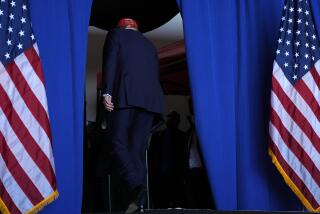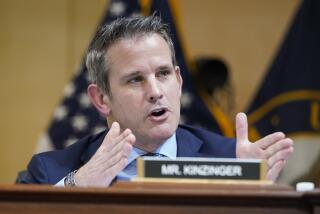After Super Tuesday, only desperate measures can stop Donald Trump
- Share via
Late in the evening on Super Tuesday, the Republicans’ former House majority leader, Tom DeLay, appeared on MSNBC and told Chris Matthews that party leaders would deny Donald Trump the party’s nomination if he arrives at the national convention in Cleveland lacking a delegate majority.
This was on a night when Trump’s victories in seven primaries set him up to dominate in the winner-take-all states coming down the pike later in March. An incredulous Matthews asked DeLay if the Republican establishment would really be bold enough to reject the man with the most delegates and anoint someone else as the GOP standard-bearer. DeLay grinned like a shark and said it was a plain matter of math. If Trump does not win a majority of delegates on his own, DeLay said, then that would mean a majority of Republicans had voted against him.
It may be simple math, but the simple reality is that such a scenario would blow the Republican Party apart. The Trump people would bolt, their candidate would probably try to run as an independent if he could still get on enough state ballots and the likely Democratic nominee, Hillary Clinton, could take a three-month vacation in the Hamptons until she glided to victory on election day.
After Tuesday’s results, there is almost no mathematical possibility of either Marco Rubio or Ted Cruz besting Trump in the delegate count, short of Trump coming out as a gay Muslim (and, even then, his uncritical admirers might still stick with him). That leaves the anti-Trump forces one desperate hope: a convention coup. It appears most institutional Republican leaders, big money donors and movement conservatives would burn their house down rather than turn their party over to Trump.
The most notable dissenter from this tactic among establishment leaders is New Jersey Gov. Chris Christie. After his own feisty candidacy went dead in the water, he shocked everyone by defecting to Trump. A former finance official in Christie’s presidential campaign, Meg Whitman, quickly spoke up to say what was surely on the minds of many Republican leaders. She called Christie’s move “an astonishing display of political opportunism.” Past New Jersey Gov. Christine Todd Whitman joined in the criticism, telling the Newark Star-Ledger, “I am ashamed that Christie would endorse anyone who has employed the kind of hate-mongering and racism that Trump has.”
Nevertheless, Christie has not shied from being Trump’s new best buddy. On Tuesday night, Trump ran his victory rally like a presidential press conference on a stage at his Mar-a-Lago estate in Florida festooned to look like a flag-cluttered corner of the White House. And there, just behind Trump’s right shoulder, Christie stood like a faux vice president.
Christie looked decidedly uncomfortable in the second-banana role. Maybe he was recalling the times he had characterized Trump as a “carnival barker” unfit for the presidency. Maybe he was wondering why it had taken Trump three days to disavow endorsements from former Ku Klux Klan leader David Duke and other white supremacists. Maybe he was stewing about the six New Jersey newspapers that had just called for him to resign as governor.
Or maybe he was just stunned by having ended up in such a humiliating situation. This was not at all the outcome he had hoped for in this presidential campaign. Clearly, that is a sentiment shared by the entire shattered, impotent Republican establishment.
More to Read
A cure for the common opinion
Get thought-provoking perspectives with our weekly newsletter.
You may occasionally receive promotional content from the Los Angeles Times.











